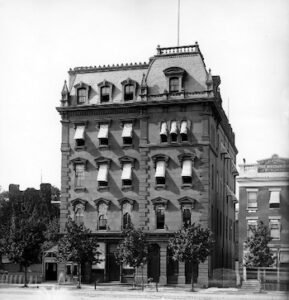
The Freedman's Savings Bank
*The Freedman's Savings Bank opened on this date in 1865. It was the first federal bank in America. Also known as the Freedman's Saving and Trust Company, it was a private savings bank chartered by the U.S. Congress to collect deposits from newly emancipated slaves.
At the end of the American Civil War, the poor economic conditions of the former slaves were aggravated by the economic devastation of the Southern states. The newly freed Blacks had few economic resources or capital and less exposure to private enterprise. Many soon turned to sharecropping and forced labor in the South. To help alleviate their socio-economic conditions, the Republican-controlled U. S. Congress established the Freedmen's Bureau, passing an act of incorporation and a charter for the Freedman's Saving and Trust Company, which was signed into law by President Abraham Lincoln (13 Stat. 510).
The founder of the Freedman's Savings Bank, John W. Alvord, was inspired by the success of existing military savings banks created during the war to collect the wages of Black soldiers. General Rufus Saxton established the first one in Beaufort, South Carolina 1864. Other examples include a bank in Norfolk, Virginia, established by General Benjamin Butler in late 1864, and a bank in Louisiana created by General Nathaniel Banks. Many former slaves liberated by the Union Army were paid to join the army. Troops earned a little cash from their enrollment and participation, and the Freedman's Bank became the first banking entity to include them.
Most accounts held between $5 and $50. From 1865 to 1868, the Freedman's Bank expanded through money collected from Black soldiers. In the bank's first year, 1865, two branches were established by transferring existing local military savings institutions. Many other branch locations opened explicitly based on the local Black soldier population. Bank officials made efforts to build the bank's legitimacy and deposits, raising part of the Black soldiers' wages; many cashiers at branches also worked as military disbursing officers. The Freedman's Bank grew steadily in its first five years. By 1870, Blacks had deposited $12.6 million (approximately $292 million today) into accounts in 30 mid-Atlantic and South branches.
The bank opened 37 branches across 17 states and Washington, DC, within 7 years and collected funds from over 67,000 depositors—however, the rapid development of the bank led by false claims, mismanagement, and fraud. As Blacks' hard-earned money flowed into the bank's coffers, one of the most influential bankers in America, white-American Henry D. Cooke, infiltrated it. Cooke was the president of the Washington, DC branch of Jay Cooke & Co., America's first investment bank. A politically astute lobbyist, Cooke eagerly accepted a spot on the Freedman's Bank Board of Trustees and quickly controlled the bank's finance committee.
He led the charge to amend the bank's charter. The Freedman's Bank would no longer operate as a savings bank to accept the deposits of former slaves. Instead, with Congress's approval, the bank would operate as a commercial bank and make loans to increase the bank's profitability. This move foretold the bank's demise and jeopardized Black customer's money. As the bank's trustees began making millions of dollars in loans to their white business partners, Blacks continued opening accounts and depositing their money into the bank. By 1872, the bank counted over 70,000 accounts and over $31.2 million (approximately $774.6 million today) in deposits.
Yet, this was when the bank's foundations started to crack. A financial panic in 1873 exposed the bank's fragilities. It was overleveraged. Though bank depositors had been placing millions of dollars in their accounts, in late 1873 and early 1874, depositors could not withdraw their money. Instead, they had to wait weeks to retrieve the contents of their accounts. Not even abolitionist Frederick Douglass, whom the bank's trustees convinced to accept the role as the bank's president in March 1874, could restore Black confidence in the bank.
On June 29, 1874, Congress ordered the bank to suspend operations. The 61,144 depositors who still held accounts, many of whom poured their savings into this financial institution, lost what remained in the bank. By July 1874, depositors only had collectively $3 million in their accounts. The Treasury Annex later occupied the site where the bank's headquarters once stood. The Annex was renamed the Freedman's Bank Building in 2016.
Become a Purchasing Manager or Buyer
To become a Financial Management Analyst